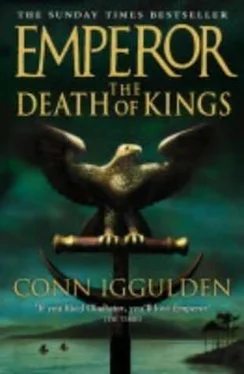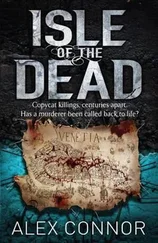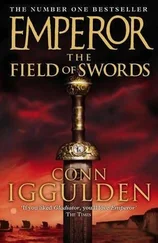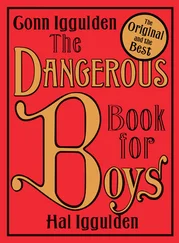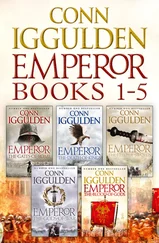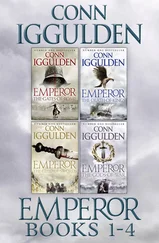He was so young, she thought. Young and foolish and learning that life could be bitterly unfair. How long had she waited for love before finding it with Tubruk? Cornelia would have freed her to marry and he would have asked once he'd gathered his courage. Now there was nothing left for her, and the girl she'd nursed as a baby lay still and quiet in another room. When she had the strength, Clodia knew, she would be the one to wrap Tubruk's battered body and clean his skin for the last time. But not for a while.
“I'll stay,” she said, and wondered if he heard her.
Cato stood in the forum under a dark sky, his toga stripped from his shoulders to reveal a mass of white flesh that shone with running beads of water. His back was marked with stripes where the whips had fallen, the pain only an echo of the anger and disgust he felt for the petty men who had brought him down. Not one of them would have disdained to act as he had, if the opportunity had come. Yet they glared and pointed at him as if they were not of his breed at all. He sneered at them, holding his head high even as the executioner came forward, the long sword gleaming in his hands.
Pompey looked on without a show of the pleasure he felt. He had delayed joining Crassus to see this task finished. He would have preferred to see the fat hands nailed to a wooden beam and displayed in the forum for a lingering death. Such an ending would be more fitting for Cato. At least there had been pleasure as Cato's family were sold into slavery despite his cries. The house had been given over to the Senate, and the funds raised by its sale would go some way toward financing the legions Pompey took with him against the slaves.
Julius watched numbly at Pompey's side. The general had ushered him forward in triumph to share in the pleasure of the execution, but he felt nothing. There was no joy in seeing Cato killed. It was no more than ending the life of a dog or crushing a stinging insect. The bloated senator understood nothing of the grief he had caused, and nothing he could suffer would bring Cornelia back. Let this be quick, he whispered to himself as he watched. Let it all end.
Cato spat on the stones of the forum as he looked around at the crowd of senators and citizens that had massed to see the execution. For once, there was no sense of danger from the crowd. He had never been popular with the people of the city-as if anyone could care what they thought or did. He spat again, his mouth curling in anger at the sight of the waiting mob. Animals, all of them, with no understanding of how a great man could bend the law under his hand. Marius had done it; Sulla had. None of them could understand that there was no law but that which could be held.
Footsteps sounded and Cato turned his head to see Pompey striding toward him. He grimaced. The man didn't even have style enough to let him die without a few more jeers and taunts. He was not made for greatness. Sulla would have allowed his enemy the dignity of a private death, no matter what had passed between them. There was a man who understood what power meant.
Pompey moved close enough to speak into Cato's ear.
“Your family will not live long as slaves. I have bought them all myself,” the sibilant voice whispered.
Cato looked coldly at him. “Germinius too?” he asked.
“He will not survive the final battle.”
Cato smiled at that. He wondered if Pompey would find Julius and Brutus any easier to deal with than he had. He raised his head in defiance. It seemed fitting to have his line end with him. He'd heard of kings in ancient times who had their families thrown alive onto their pyres. Pompey was a fool to try to hurt him.
“You will know a day like this one,” he said to Pompey. “You are too small a man to hold this city in your hand for long.” He laughed aloud then as Pompey's face contorted with a spasm of anger.
“Take up your sword and finish him,” the general snapped at the executioner, who bowed low to the ground in response as Pompey stalked back to the waiting senators. Cato nodded to the man. He felt tired all of a sudden, almost numb.
“Not today, boy. Some things have to be done by a man's own hand,” he muttered, removing a heavy bracelet from his wrist. With his thumb, he eased out a razor from the edge of it and turned to face the crowd, sneering at them. With a jerk of his hand, he nicked the side of his throat, cutting the heavy arteries, then stood waiting as blood poured out over his white flesh, drenching him.
The executioner stepped forward nervously, but Cato had strength enough to raise his hand, refusing the blade. The crowd watched with animal fascination as his legs began to shiver and then suddenly he fell to his knees with an audible crack on the stone. Even then, he glared at them all before slumping forward in a heap.
The gathered citizens sighed as the tension of the death was released. Despite the crimes they whispered to each other, the courage of the senator stole the pleasure they had come to find. They began to disperse without a sound, passing the slumped body with bowed heads and more than a few muttered prayers.
Pompey pursed his lips in anger. The joy of vengeance was missing at such an ending, and he felt as if something had been stolen from him. He signaled his guards to remove the body, turning to Julius.
“Now we go south, to finish it,” he said.
***
The general looked at Crassus in amazement.
“Sir, you're talking about more than twenty miles of broken land! I urge to you reconsider. We should occupy a central position, ready to stop them breaking through.”
Crassus waited until the man had finished, his fingers tapping nervously on his table as he listened. It was the only thing to do, he was certain. The slaves were trapped against the coast, and if Pompey had reached the galleys, there would be no one to take them off. All he had to do was hold them, bottle them up in the spit of land at the base of the country. He glanced at Pompey's map on the wall. It looked such a tiny distance, there.
“My orders to you are clear, General. Fresh legions are coming from the north, with Pompey. We will hold the line until they arrive, and I want a fortification cutting across country. You are wasting my time.” His voice held a dangerous edge. Surely the man wouldn't hesitate this way if Pompey were giving the orders. It was insufferable.
“Get out!” he snapped at the man, rising from his chair. When he was alone, he sank back again, rubbing nervously at his forehead as he looked at the map again.
Every noise in the night made him jolt awake, terrified the slaves had broken through to pillage the country. It could not be allowed again. At first he had thought of crushing them against the sea, but what if they fought as they had in the north? With escape barred to them, they would be desperate, and if they overran the Roman lines, Crassus knew he'd be finished, even if he survived the battle. The Senate would call for his execution. He grimaced. How many of them had debts that only his death would erase? He could imagine their pious faces as they discussed his fate in Senate. He understood the pressure a little better since Pompey had left him. There was no one to ask; the decisions were his alone.
He crossed to the map and ran his finger across the narrowest neck of land at the toe of the country.
“We will hold you here until the new legions come,” he said, frowning. Twenty miles of banked earth. Such a line had never been built before, and the people of Rome would tell their children about it when it was done. Crassus, who built a wall across a country. He scrubbed his finger across the point again and again until a darker line showed on the skin.
It would hold them unless Pompey had failed to gather enough galleys to stop the slaves escaping. Then he would be the laughingstock of the country, guarding nothing but fields. Shaking his head to clear it, he sat down again to think.
Читать дальше
Конец ознакомительного отрывка
Купить книгу
